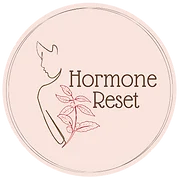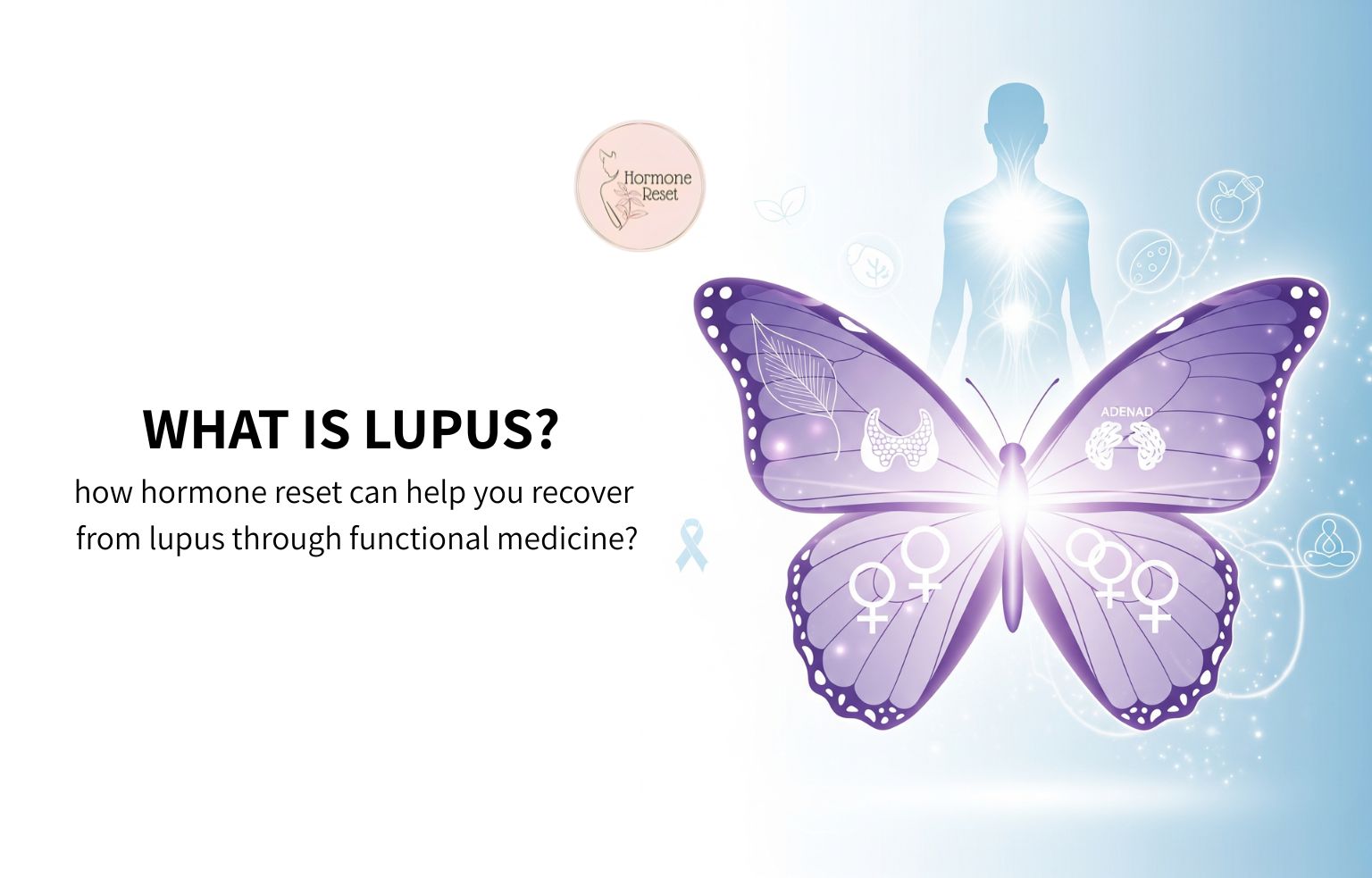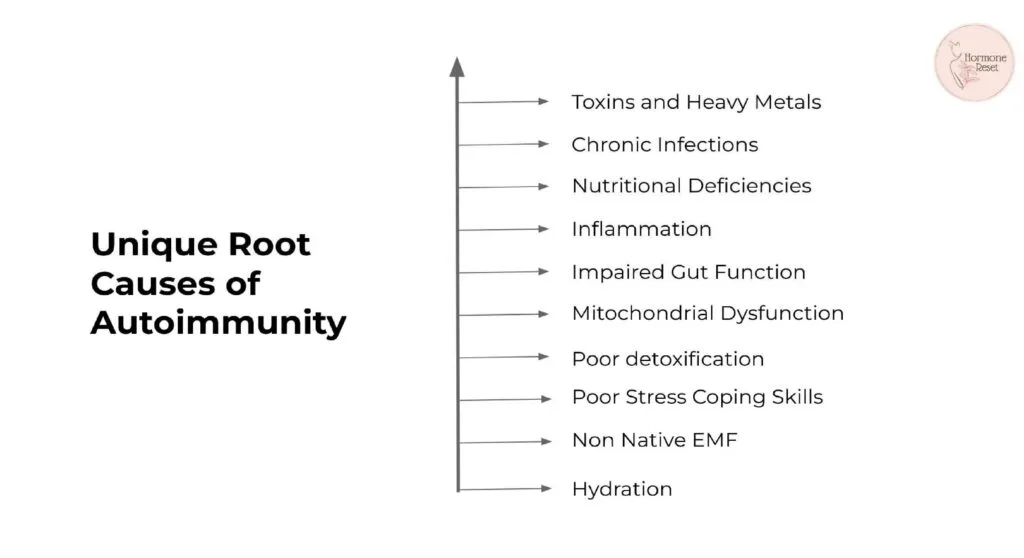Hormones are the body’s chemical messengers, regulating everything from metabolism and mood to sleep and fertility. When they are balanced, you feel energised, focused, and strong. When they are out of sync, you may experience fatigue, weight gain, mood swings, brain fog, and various other health issues like fibromyalgia, PCOS, infertility, PMS, autoimmunity, diabetes, hypothyroidism, anxiety, depression and more.
Why Do Hormones Get Imbalanced? What are the Causes of Hormonal Imbalance?
Hormonal imbalances don’t happen overnight. They develop due to various factors, including:
- Chronic Stress – Elevated cortisol levels affect thyroid and reproductive hormones amongst many others, leading to fatigue, weight gain, and immune dysfunction.
- Poor Diet – Processed foods, sugar, and unhealthy fats disrupt insulin sensitivity, which leads to various downstream effects like estrogen progesterone imbalance, increasing the risk of metabolic and various other disorders.
- Environmental Toxins – Endocrine disruptors in plastics, beauty products, and pesticides mimic hormones and interfere with normal function, leading to hormonal chaos and dysfunction.
- Gut Issues – An unhealthy gut microbiome affects various hormones like estrogen metabolism and affects immune and other functions, contributing to digestive issues and inflammation.
- Nutrient Deficiencies – Essential vitamins and minerals such as magnesium, zinc, omega 3 fatty acids and B vitamins are crucial for hormone production and balance.
- Sleep Deprivation – Poor sleep quality impacts melatonin, cortisol, and other crucial hormones, leading to a cascade resulting in various issues including weight gain and impaired cognitive function.
- Excessive Exercise or Sedentary Lifestyle – Overtraining initially increases and later may suppress cortisol production, while lack thereof contributes to insulin resistance and poor circulation.
The good news? Functional medicine provides a natural and effective approach to resetting your hormones and restoring balance.
Do You Have a Hormone Imbalance? Symptoms of Hormonal Imbalance

- Fatigue and Low Energy: Persistent tiredness, even after sufficient rest, may signal imbalances in cortisol (stress hormone), thyroid hormones (regulate metabolism), or insulin (regulates blood sugar). These imbalances can lead to adrenal fatigue or thyroid sluggishness.
- Weight Gain and Difficulty Losing Weight: Hormonal disruptions, particularly involving insulin resistance, elevated cortisol, low thyroid hormones, or estrogen dominance, can make weight loss difficult. Fat often accumulates around the midsection or hips and thighs.
- Mood Swings, Anxiety, and Depression: Low levels of progesterone and estrogen fluctuations can contribute to irritability, sadness, and anxiety. Elevated cortisol from chronic stress and low thyroid function also affect neurotransmitter levels, worsening mood issues.
- Sleep Disturbances and Insomnia: Disrupted cortisol rhythms (elevated at night or too low during the day), melatonin imbalance, and low progesterone can cause difficulty falling asleep or staying asleep.
- Irregular Menstrual Cycles and PMS: Heavy, painful, or irregular periods may signal estrogen dominance, low progesterone, or underlying conditions like PCOS or thyroid disorders. PMS symptoms like bloating, mood swings, and breast tenderness are also linked to these imbalances.
- Low Libido and Fertility Issues: Low estrogen, testosterone, or progesterone levels can reduce sex drive and cause infertility. High cortisol and insulin resistance interfere with ovulation and normal reproductive hormone cycles.
- Brain Fog and Poor Concentration: Forgetfulness, lack of mental clarity, and difficulty focusing may stem from thyroid dysfunction, blood sugar instability, or inflammation triggered by hormonal imbalance.
- Skin and Hair Changes: Thinning hair, dry or acne-prone skin, and brittle nails may reflect low thyroid function, excess androgens (as in PCOS), or estrogen imbalance. These symptoms often appear alongside menstrual irregularities.
- Digestive Problems and Bloating: Estrogen plays a role in gut motility and microbial balance. Imbalance—especially estrogen dominance—can slow digestion and promote bloating, while gut dysbiosis can impair estrogen clearance, creating a feedback loop.
- Temperature Sensitivity: Cold hands and feet, intolerance to cold, or excessive sweating and hot flashes are signs of thyroid dysfunction or perimenopausal hormone fluctuations.
Also Read: Do Not Miss The Signs Your Periods Are Giving You About Your Body Health
The Science Behind Hormone Imbalance
A hormone reset is a strategic approach to bring your hormones back to their optimal levels by making targeted lifestyle and dietary changes. This approach works by targeting the root causes like eliminating triggers, nourishing the body, and supporting detox pathways.
How Hormones Communicate in the Body
Hormones don’t work in isolation—they function in a delicate balance. A few of these hormone interactions include:
- Cortisol & Insulin: Chronic stress increases cortisol, which raises insulin and leads to fat storage, particularly around the abdomen. This process often is the root cause of type 2 diabetes.
- Cortisol and Thyroid: Generally these two are inversely related. For example, an increase in stress increases cortisol secretion, which in turn reduces the thyroid function.
- Thyroid & Estrogen: High estrogen can interfere with thyroid hormone production, leading to sluggish metabolism, weight gain, and fatigue.
- Progesterone & Stress: When stress is high, progesterone levels drop, affecting mood, sleep, and reproductive health, potentially leading to infertility.
How Functional Medicine Can Cure Hormone Imbalance?

Hormone Reset is a science-backed method that focuses on identifying and addressing the root causes of imbalances rather than just treating symptoms. Instead of relying on medication alone, this approach combines personalized nutrition, lifestyle changes, and advanced lab testing to restore optimal hormone function.
Step 1: Comprehensive Hormone Testing & Diagnosis
Unlike traditional medicine, which often overlooks underlying issues, functional medicine starts with comprehensive lab testing to evaluate:
- Cortisol and adrenal function to detect chronic stress and fatigue.
- Thyroid hormone levels (total t3 and t4, free t3 and t4 and tsh) to assess metabolism and energy production.
- Insulin and blood sugar balance to prevent diabetes and metabolic disorders.
- Estrogen, progesterone, and testosterone levels to ensure reproductive and overall health.
- Gut health and microbiome diversity to improve digestion and hormone detoxification.
- Nutrient deficiencies and inflammatory markers to guide dietary and supplement recommendations.
- Liver function markers and symptoms to assess liver health and function as optimal liver function is important to ensure proper hormonal balance.
Step 2: Personalized Nutrition & Detoxification
Food plays a crucial role in hormone balance. Functional medicine recommends:
- Anti-inflammatory foods – Leafy greens, berries, and turmeric reduce oxidative stress and inflammation.
- Hormone-balancing fats – Avocados, wild-caught fish, coconut oil, and nuts support cellular function and hormone production.
- Fiber-rich foods – Cruciferous vegetables (broccoli, cauliflower, cabbage) help detox excess estrogen and improve digestion.
- Liver-supporting nutrients – Dandelion root, milk thistle, beets, and lemon water enhance the body’s natural detoxification pathways.
- Balancing blood sugar – Prioritizing protein, healthy fats, and fiber helps prevent insulin spikes, which contribute to weight gain and fatigue.
- Intermittent fasting – A well-planned fasting regimen can help regulate insulin, support metabolism, and enhance detoxification.
Transform Your Health One Meal at a Time?
Looking for hormone-balancing recipes that are as delicious as they are healing. Whether you’re dealing with PCOS, thyroid issues, or just want to reset your body naturally — we’ve got simple, nourishing recipes waiting for you.
Step 3: Restoring Gut Health & The Gut-Hormone Connection
A healthy gut is key to hormone regulation. Functional medicine supports digestion with:
- Probiotics & Prebiotics – Restore beneficial bacteria and improve hormone metabolism by enhancing digestion and reducing bloating.
- Digestive Enzymes – Enhance nutrient absorption and reduce gut-related hormone imbalances.
- Gluten & Dairy Reduction – Helps prevent inflammation and autoimmune responses that impact thyroid and reproductive health.
- Collagen & Bone Broth – Supports gut lining integrity and hormone production, reducing symptoms like bloating, acne, and joint pain.
Step 4: Stress Management & Sleep Optimization
Stress and poor sleep wreak havoc on hormones. Functional medicine recommends:
- Sleep Hygiene – Maintaining a regular bedtime, avoiding blue light before sleep, and using magnesium supplementation improve sleep quality and hormone regulation.
- Adaptogenic Herbs – Ashwagandha, rhodiola, and holy basil help regulate cortisol levels and support adrenal function.
- Mindfulness & Meditation – Regular excercise and deep breathing meditation reduce stress and improve hormone balance.
- Infrared Sauna & Epsom Salt Baths – These detoxification techniques support relaxation, lower inflammation, and enhance hormone function.
Take Control of Your Hormones Today
If you’re struggling with fatigue, mood swings, unexplained weight gain, or other symptoms of hormonal imbalance, it’s time to take action. Your body is designed to heal—it just needs the right support.
Start your journey to hormone balance today with expert guidance from HormoneReset and experience the power of functional medicine. Book your Free Discovery Call Now!
References:
- Using Functional Nutrition to Address Hormone Imbalances – Rupa Health
- Could Your Hormonal Imbalance Be Solved with Functional Medicine? – Northwest Nurse Practitioners
- Why Functional Medicine Could Be the Answer to Your Hormone Health in 2024 – Marion Gluck Clinic
- A Functional Medicine Approach to Hormone Imbalance – London Centre for Functional Medicine
- Functional Medicine for Hormonal Imbalances – Dr. Stavy
Hormones: A Functional Medicine Perspective – Crossing Back to Health




















